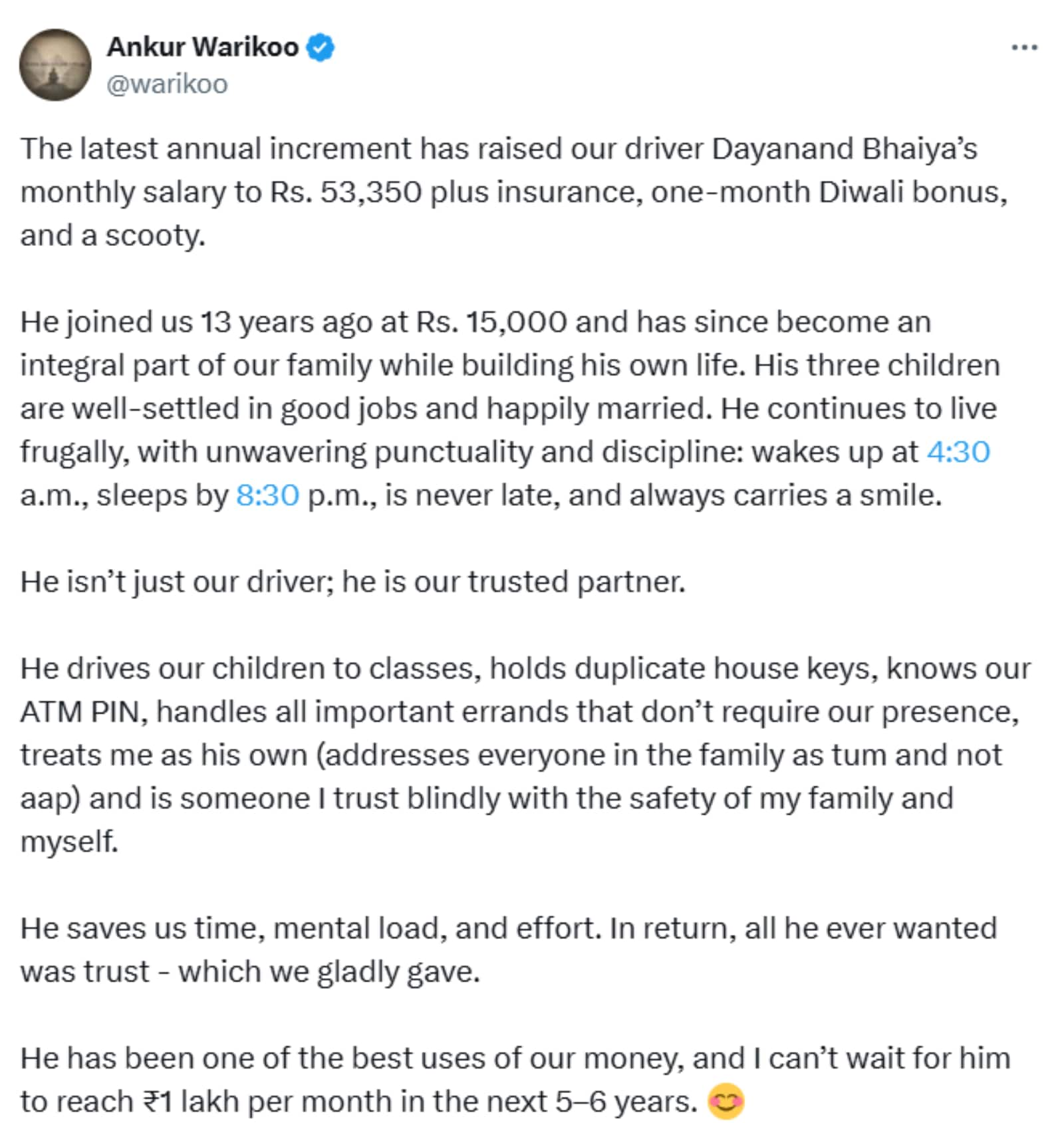📣 For more lifestyle news, click here to join our WhatsApp Channel and also follow us on Instagram
As Ankur Warikoo shares driver’s salary, calls him ‘trusted partner,’ psychologist decodes what leads to long-term staff becoming ‘family’: ‘He knows our ATM pin’
Ankur Warikoo’s viral post praising his longtime driver sparked conversations about loyalty and long-term commitment in households.
 Ankur Warikoo’s viral post praising his longtime driver sparked conversations about loyalty and long-term commitment in households.
Ankur Warikoo’s viral post praising his longtime driver sparked conversations about loyalty and long-term commitment in households. Entrepreneur Ankur Warikoo recently went viral for a heartfelt post praising his longtime driver, calling him “one of the best uses of our money.” What caught the internet’s attention wasn’t just gratitude, but the transparency: a solid monthly salary, insurance, and a Diwali bonus. Warikoo wrote that he hopes his driver reaches a salary of Rs 1 lakh in the next few years—a rare gesture of long-term commitment in employer–employee relationships.
“He isn’t just our driver; he is our trusted partner…He saves us time, mental load, and effort. In return, all he ever wanted was trust – which we gladly gave. He has been one of the best uses of our money, and I can’t wait for him to reach ₹1 lakh per month in the next 5–6 years,” Ankur shared in his post.
What creates such deep trust between employers and long-term staff, where responsibilities extend to children, finances, and even household safety?
According to Delhi-based psychologist Priyanka Bhosale, “Such bonds evolve when reliability, emotional safety, and mutual respect grow consistently over time. They stop feeling like employment and start feeling like belonging.” Trust, she added, “is not built through big gestures—it forms through repeated demonstrations of reliability. It grows every time someone silently proves, “I won’t let you down.”
She explained, “When a person protects your children as if they were his own, handles money like it’s sacred, stays alert during late-night travel, emergencies, or illness—long after ‘work hours’ are over… something shifts inside a family. Consistency creates emotional safety. When someone shows up for you again and again, the brain begins to categorise them as family, not staff.”
 Ankur Warikoo’s viral post (Photo: X/Ankur Warikoo)
Ankur Warikoo’s viral post (Photo: X/Ankur Warikoo)
How do routine, discipline, and frugality—like waking up at 4:30 a.m. and living simply—shape a person’s sense of purpose?
Discipline, said Dr Bhosale, “is deeply tied to self-worth. Stable routines regulate the mind, reduce anxiety, and create a sense of internal order.”
She explained, “A person who wakes before sunrise, eats without fuss, sleeps on time, spends only what is necessary, works with pride has something rare in today’s world: clarity.”
Bhosale noted, “Minimalist living strengthens self-control, which in turn enhances confidence and purpose. Their joy comes not from owning much, but from living with intention, dignity, and inner calm. In a world full of noise, their stillness speaks the loudest.”
When a driver becomes “family,” how does emotional connection affect loyalty and job satisfaction?
According to Bhosale, “When someone feels valued as a human being and not just a worker, loyalty becomes intrinsic. Their identity becomes intertwined with the well-being of the family.”
She continued, “ The person no longer protects the family out of duty, but out of affection. The steering wheel becomes the responsibility. The job becomes pride. It stops being: ‘I work here.’ and becomes: ’These are my people.’”
📣 For more lifestyle news, click here to join our WhatsApp Channel and also follow us on Instagram



- 01
- 02
- 03
- 04
- 05
























